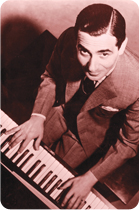 |
Sunday, January 11, 3:30pm & Tuesday, January 13, 8pm |
Programme notes
Irving Berlin's life spanned more than 100 years, and his catalogue includes at least 1,500 songs. When he died in 1989, the New York Times wrote, "Irving Berlin set the tone and the tempo for the tunes America played and sang and danced to for much of the 20th century."
He was born Israel Beilin on May 11, 1888, in a village near the city of Mogilyov, Russian Empire (now Belarus), one of eight children. The family emigrated to New York in 1893 as part of the mass exodus of Russian Jews escaping the new wave of pogroms under the reign of Tsar Nicholas II. His father died in 1901, and at the age of thirteen the young Irving took to the streets in various odd jobs, working as a newspaper boy, a busker, and eventually by 1906 as a singing waiter at the Pelham Cafe in Chinatown.
There, in his free time, he taught himself to play the piano. His first attempt at songwriting was "Marie From Sunny Italy," written in collaboration with the Pelham's resident pianist, Mike Nicholson. The sheet music to this song made history because of a printer's error in the score, which rendered his name as I. Berlin.
By 1911 he was a staff lyricist with the Ted Snyder Company, and he had his first major international hit, "Alexander's Ragtime Band". Over the next five decades, he produced an outpouring of ballads, dance numbers, novelty tunes and love songs that came to define American popular song. He wrote seventeen complete scores for Broadway musicals and revues, and contributed material to six more. In Hollywood, he wrote the scores for numerous classic movie musicals, including Top Hat, Follow The Fleet, On The Avenue, Holiday Inn, Easter Parade, and White Christmas; and his songs have provided memorable moments in dozens of other films as far apart in space and time as The Jazz Singer (1927) and Titanic (1997).
Berlin never forgot his humble origins. His friend and fellow songwriter George M. Cohan once said, "The thing I like about Irvie is that although he has moved up-town and made lots of money, it hasn't turned his head. He hasn't forgotten his friends, he doesn't wear funny clothes, and you will find his watch and his handkerchief in his pockets, where they belong." He was also a passionate patriot. He claimed he owed all his success to his adopted country, and is said to have rejected his lawyer's advice to invest in tax shelters, insisting, "I want to pay taxes. I love this country."
Berlin's first wife, Dorothy Goetz, died in 1912 after only six months of marriage, of typhoid fever, which she had contracted during their honeymoon in Havana. The song he wrote to express his grief, "When I Lost You", was his first ballad.
Years later, in the 1920s, he fell in love with a young heiress, Ellin Mackay. Her father, rich and socially prominent, opposed the match from the start, and disowned her after the couple eloped. But their marriage was a true love affair. They had four children, and were inseparable for 63 years, until Ellin's death in 1988.
Through it all, Berlin continued to pour out songs. According to his publisher, "it was a ritual for him to write a complete song, words and music, every day." He once asked his friend Victor Herbert whether he should study composition. "You have a natural gift for words and music," Herbert told him. "Learning theory might help you a little, but it could cramp your style." Berlin took his advice, and the result speaks for itself. In the words of the great Jerome Kern, "Irving Berlin has no place in American music – he is American music."
 |
 |
